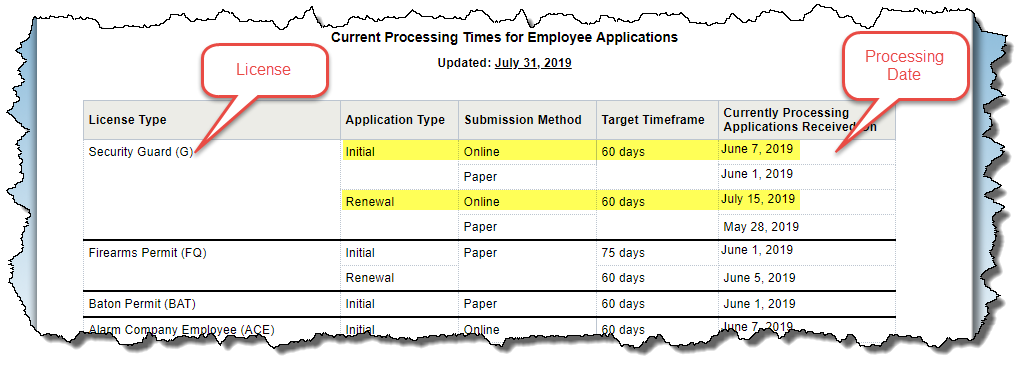
California BSIS Unarmed Guard Card Application Processing Timeframes
The BSIS strives to complete the application review process within 2-months (60-days). The online (versus paper) process is a week or so faster.
Contents
BSIS Application Processing Timeframes
Wondering how long the BSIS is taking to process applications? Click the links below to find out!
The table linked below lists the curent date from which the BSIS is processing applications. For example, if the date listed in March 8, the BSIS is processing application received on or before March 8th. If your application was submitted after that date, then the BSIS has not even looked at your application yet.
Please be advised that the processing times listed represent non-deficient applications. Applications with one or more deficiencies will require additional time for processing.
https://www.bsis.ca.gov/forms_pubs/app_processing_timeframes.shtml
If you have not heard from the Bureau within 6 weeks from submission of a BreEZe online application or 8 weeks from submission of a paper application, email the Bureau at bsis@dca.ca.gov.

Live Scan Processing Timeframes
The California Department of Justice (DOJ) now allows applicants to check the status of Live Scan fingerprint background checks. Click the link below and complete the form.
https://applicantstatus.doj.ca.gov/
Initial Applications: Common Delays
- The application submitted is outdated (i.e. did not use the current version on the Bureau's website).
- The application is incomplete (i.e. required information is missing or the application is not signed).
- The name on the application form does not match the name entered by the Live Scan Operator. For example, using "Don" and "Donald" or hyphenated and unhyphenated names. TIP: Use the same name on your application that is on your Driver's License.
- The personal identifier information (social security number, individual taxpayer identification number, or date of birth) listed on the application does not match the personal identifier information entered by the Live Scan Operator.
- The live scan form used does not match the application type (i.e. using a "proprietary private security officer" live scan form instead of a "security guard" live scan form when applying for a security guard registration).
- The fee amount paid is incorrect.
- DOJ and/or FBI rejecting the fingerprint responses due to poor quality. Fingerprint rejections require the applicant to resubmit fingerprints.
- Delays in DOJ and FBI fingerprint responses. The Bureau has no control over the time it takes the DOJ and FBI to provide their responses to the Bureau.
- Criminal history information received on an applicant from DOJ and/or FBI requires Bureau staff to review it in its totality to determine the applicant's fitness for licensure.
Renewal Applications: Common Delays
- Failing to submit your renewal application and payment to the Bureau at least 60 days before your current license's expiration date. Security Guard, Locksmith Employee, Alarm Employee and Repossession Employee registrants are required, by law, to submit their renewal applications at least 60 days prior to expiration of the current registration. However, the Bureau is unable to process renewal applications received more than 90 days expiration.
NOTE: While not required by law, all other license types should submit their renewal applications to the Bureau at least 60 days, but not more than 90 days, before expiration to provide sufficient time for the Department of Consumer Affairs Cashiering Office and the Bureau to process the renewal application before expiration. - Make sure you are using the current version of the renewal application for your license type. An outdated form may be considered deficient and may require the Bureau to request the applicant to complete the renewal on the current application. Current renewal applications for every Bureau license type are available on the Bureau's website.
- Notify the Bureau timely of a change of address. Do not wait to update your address at the time of renewal. By law, a Bureau licensee (including registrants, permit holders and certificate holders) is required to notify the Bureau of a change in his/her address within 30 days. Providing the change of address on the renewal application will likely cause a delay in the renewal process. If you renew your registration/license/permit and update your address online at the same time, the licensing system may mail your renewal to your old address.
- Upload or mail all required documentation. Make sure to read the online BreEZe renewal screens or the hard copy application to ensure all supporting documentation required at the time of renewal is submitted. A renewal application without the supporting documentation required for the renewal is deficient and will require the Bureau to request and obtain the missing information before the renewal can be processed.
- Pay the correct renewal fee amount. Application renewals postmarked after the license expiration date are delinquent and subject to a delinquency renewal fee. A renewal application submitted with insufficient fees is delinquent and will require the Bureau to request and obtain the additional fee amount before the renewal can be processed.
- Sign the renewal application form or automated renewal coupon. Renewal application forms and coupons received without the required attestation signature are treated as a deficient application, which will delay the process of your renewal.
Information provided on this site is educational. It is not legal advice. Training does not guarantee licensing or employment.
